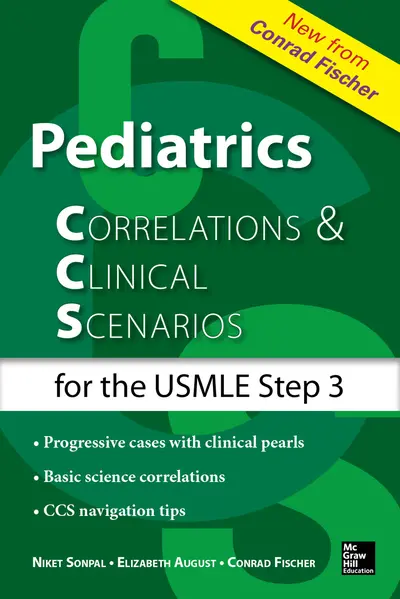My Account Details

ISBN10: 0071818898 | ISBN13: 9780071818896

Step 1 . Download Adobe Digital Editions to your PC or Mac desktop/laptop.
Step 2. Register and authorize your Adobe ID (optional). To access your eBook on multiple devices, first create an Adobe ID at account.adobe.com. Then, open Adobe Digital Editions, go to the Help menu, and select "Authorize Computer" to link your Adobe ID.
Step 3. Open Your eBook. Use Adobe Digital Editions to open the file. If the eBook doesn’t open, contact customer service for assistance.
Publisher's Note: Products purchased from Third Party sellers are not guaranteed by the publisher for quality, authenticity, or access to any online entitlements included with the product. Your Secret Weapon for Mastering the USMLE Step 3 How prepared are you for the new USMLE Step 3? Are you worried about answering questions on basic science concepts? Uncertain about managing the clock in CCS cases? Unprepared to answer questions on pediatric topics? This book is the balm. Created by bestselling author and lecturer Dr. Conrad Fischer, Dr. Elizabeth August, and Dr. Niket Sonpal, Pediatrics: Correlations & Clinical Scenarios provides an entertaining and comprehensive review of internal medicine topics on the USMLE Step 3.Progressive clinical cases--embedded with meaningful foundational science correlations and CCS exam tips--ensure that you're prepared for the new USMLE Step 3. Features: 100 pediatrics cases with Q&A provide practice for the multiple-choice exam component of the USMLE Step 3 Embedded basic science correlations prepare you to answer foundational science questions Integrated CCS navigation tips prepare you to handle Computer-based Case Simulations (CCS cases) High-yield coverage of core pediatrics topics frequently tested on the USMLE Step 3
How to Use This Book
Chapter 1. Newborn Management
Case 1: Healthy Newborn
Case 2: Neonatal Jaundice
Case 3: Neonatal Hypoglycemia
Case 4: Respiratory Distress in the Newborn
Case 5: Hyaline Membrane Disease
Case 6: Necrotizing Enterocolitis
Case 7: Congenital Malformation
Case 8: Birth Injuries
Case 9: Sepsis
Chapter 2. Genetics
Case 1: Abnormal Number of Chromosomes
Chapter 3. Growth and Development
Case 1: Milestones
Case 2: Immunizations
Case 3: Enuresis
Case 4: Encopresis
Case 5: Autism
Chapter 4. Respiratory Diseases
Case 1: Bronchiolitis
Case 2: Acute Asthma Exacerbation
Case 3: Asthma
Case 4: Pneumonia
Case 5: Foreign Body Aspiration
Case 6: Cystic Fibrosis
Chapter 5. Ear, Nose, and Throat
Case 1: Otitis Media
Case 2: Otitis Externa
Case 3: Malignant Otitis Externa
Case 4: Strep Throat
Case 5: Peritonsilar Abscess
Case 6: Retinoblastoma
Chapter 6. Endocrinology
Case 1: Hypothyroid
Case 2: Diabetes
Chapter 7. Poisoning
Case 1: Acetaminophen
Chapter 8. Orthopedics
Case 1: A Loud Clunk
Case 2: Can't Run or Climb a Tree but Can See and Pee
Case 3: My Leg Hurts
Case 4: My Knee Hurst
Case 5: Another Broken Bone?
Case 6: Sunburst or Onions
Chapter 9. Gastrointestinal
Case 1: Pink Baby Somethings
Case 2: My Baby Dislikes Milk
Case 3: My Baby Vomits
Case 4: My Chold Vomits All the Time
Case 5: Cystic Fibrosis
Case 6: My Baby Doesn't Poop
Case 7: Bloody Diarrhea
Case 8: Currant Jelly Again
Case 9: My Kid Has a Rash on His Bottom
Chapter 10. Cardiology
Case 1: Machines and Much More
Case 2: Tetralogy of What?
Case 3: Who is Ebstein?
Case 4: Transposition
Case 5: Single Truncus
Case 6: Coarctation
Case 7: Acute Rheumatic Fever
Chapter 11. Infectious Disease
Case 1: Red Eyes
Case 2: Baby is Kind of Floppy
Case 3: Bad Kitty
Case 4: Spots
Case 5: Three-Day Measles
Case 6: Fever First, Rash Later
Case 7: Mumps
Case 8: Fifths, Not Sixths
Case 9: Scarlet Fever
Case 10: Whoop, There It Is
Case 11: Steeples and Coughs
Case 12: Drool Everywhere
Index
Need support? We're here to help - Get real-world support and resources every step of the way.